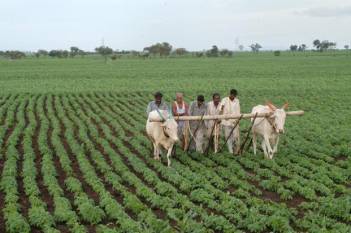Legislations will enable barrier-free trade in agricultural produce and empower farmers to engage with investors of their choice
NEW DELHI, 14 September 2020: The government has introduced three bills aimed at the transformation of agriculture in the country and raising farmers’ income in Lok Sabha today to replace ordinances promulgated on 5 June 2020.
- The Farmers' Produce Trade and Commerce (Promotion and Facilitation) Bill, 2020
- The Farmers (Empowerment and Protection) Agreement of Price Assurance and Farm Services Bill, 2020
- The Essential Commodities (Amendment) Bill, 2020
Indian minister of agriculture & farmers’ welfare, rural development & panchayati raj, Narendra Singh Tomar introduced The Farmers' Produce Trade and Commerce (Promotion and Facilitation) Bill, 2020 and The Farmers (Empowerment and Protection) Agreement of Price Assurance and Farm Services Bill, 2020, while Minister of State for Consumer Affairs, Food & Public Distribution, Raosaheb Patil Danve introduced The Essential Commodities (Amendment) Bill, 2020 in the Lok Sabha.
Seeking permission of the Chair to introduce the Bills, Narendra Singh Tomar said that the measures contained therein will enable barrier-free trade in agricultural produce, and also empower farmers to engage with investors of their choice.
He said that these steps are only the latest in a series of measures taken by the Government, which shows its continuous commitment to championing the cause of the welfare of the farmers of India.
The Farmers' Produce Trade and Commerce (Promotion and Facilitation) Bill, 2020 seeks to provide for the creation of an ecosystem where the farmers and traders enjoy the freedom of choice relating to the sale and purchase of farmers' produce which facilitates remunerative prices through competitive alternative trading channels to promote efficient, transparent and barrier-free inter-State and intra-State trade and commerce of farmers' produce outside physical premises of markets or deemed markets notified under various State agricultural produce market legislations; to provide a facilitative framework for electronic trading and for matters connected therewith or incidental thereto.
Background
Farmers in India suffered from various restrictions in marketing their produce. There were restrictions for farmers in selling agri-produce outside the notified APMC market yards. The farmers were also restricted to sell the produce only to registered licensees of the State Governments. Further, Barriers existed in the free flow of agriculture produce between various States owing to the prevalence of various APMC legislation enacted by the State Governments. This legislation is a historic-step in unlocking the vastly regulated agriculture markets in the country.It will open more choices for the farmer, reduce marketing costs for the farmers and help them in getting better prices. It will also help farmers of regions with surplus produce to get better prices and consumers of regions with shortages, lower prices.
The Farmers (Empowerment and Protection) Agreement of Price Assurance and Farm Services Bill, 2020 seeks to provide for a national framework on farming agreements that protects and empowers farmers to engage with agri-business firms, processors, wholesalers, exporters or large retailers for farm services and sale of future farming produce at a mutually agreed remunerative price framework in a fair and transparent manner and for matters connected therewith or incidental thereto.
Background
Indian agriculture is characterized by fragmentation due to smallholding sizes and has certain weaknesses such as weather dependence, production uncertainties, and market unpredictability. This makes agriculture risky and inefficient in respect of both input & output management. This legislation will transfer the risk of market unpredictability from the farmer to the sponsor and also enable the farmer to access modern technology and better inputs. It will reduce the cost of marketing and improve the income of farmers. Farmers will engage in direct marketing thereby eliminating intermediaries resulting in full realization of price. Farmers have been provided with adequate protection. An effective dispute resolution mechanism has been provided with clear timelines for redressal.
The Essential Commodities (Amendment) Bill, 2020 seeks to remove commodities like cereals, pulses, oilseeds, edible oils, onion and potatoes from the list of essential commodities. This will remove fears of private investors of excessive regulatory interference in their business operations. The freedom to produce, hold, move, distribute, and supply will lead to the harnessing of economies of scale and attract private sector/foreign direct investment into the agriculture sector.
Background
While India has become surplus in most agri-commodities, farmers have been unable to get better prices due to lack of investment in cold storage, warehouses, processing and export as the entrepreneurial spirit gets dampened due to Essential Commodities Act. Farmers suffer huge losses when there are bumper harvests, especially of perishable commodities. The legislation will help drive up investment in cold storages and modernization of the food supply chain. It will help both farmers and consumers while bringing in price stability. It will create a competitive market environment and also prevent wastage of agri-produce that happens due to lack of storage facilities.
Image credit: Livemint.com




















